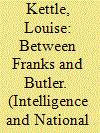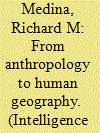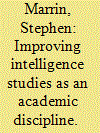| Srl | Item |
| 1 |
ID:
143757


|
|
|
|
|
| Summary/Abstract |
Lessons for the intelligence community were publicly identified in a 1983 report by Lord Franks and a 2004 report by Lord Butler. However, little is known of the lessons learned during the 20 years between the two. This article draws upon two newly released, previously classified, documents which examine British intelligence lessons from the 1990–91 Gulf War. It provides a previously untold account of the crisis, exclusively from a British intelligence perspective, and presents new evidence that intersects across many intelligence debates. This article also challenges whether identified lessons remained learned and begins to question the wider learning process within the intelligence community.
|
|
|
|
|
|
|
|
|
|
|
|
|
|
|
|
| 2 |
ID:
143759


|
|
|
|
|
| Summary/Abstract |
This article examines the relationships between the CIA and the US domestic press during the 1950s through the lens of CIA covert interventions in Guatemala and Indonesia. It disputes interpretations of the press/CIA relationship that argue for significant control exercised by the CIA, and contends that there were several types of press/CIA relationship, ranging from cooperation to hostility. The most common relationship was one of friendly confluence, rooted in Cold War considerations; even well-disposed reporters, though, tended to be careful about preserving their independence. This article concludes that while the CIA/press relationships generally resulted in reporting favorable to the CIA, there were counter-trends in the 1950s that laid the groundwork for the later collapse of the CIA's public image.
|
|
|
|
|
|
|
|
|
|
|
|
|
|
|
|
| 3 |
ID:
143754


|
|
|
|
|
| Summary/Abstract |
Human terrain is a complicated term. It has been plagued with controversy in recent years stemming from US Army implementations in the Middle East. This paper reviews the history of human terrain in three forms: as a human behavioral concept, a conflict based application, and a multidisciplinary area of research. It investigates the history of the term and its evolution from anthropological foundations to human geography and geospatial intelligence. Recommendations are given and practices are suggested to gain knowledge and understanding of people that can assist in helping in hazardous situations and avoiding conflict.
|
|
|
|
|
|
|
|
|
|
|
|
|
|
|
|
| 4 |
ID:
143760


|
|
|
|
|
| Summary/Abstract |
As the field of intelligence studies develops as an academic complement to the practice of national security intelligence, it is providing a base of knowledge for intelligence practitioners to interpret their past, understand their present, and forecast their future. It also provides the basis for broader understanding of intelligence as a function of government for other government and security officials, academicians, and the general public. In recent years there has been significant growth in the numbers and kinds of intelligence-related educational and training opportunities, with the knowledge taught in these courses and programs derived from the body of intelligence studies scholarship. The question posed here is: to what extent is this body of knowledge sufficient as a basis for the development of intelligence studies as an academic discipline?
|
|
|
|
|
|
|
|
|
|
|
|
|
|
|
|
| 5 |
ID:
143755


|
|
|
|
|
| Summary/Abstract |
The literature on intelligence analysis has a glaring hole: assessment of the management of analysts and their work. This gap is striking because managers influence all aspects of analysis and share responsibility with analysts for analytic successes and failures. While many managers ably recruit, train, mentor, and manage their analysts, they also are responsible for pathologies that negatively affect analysis and are often incorrectly attributed to analysts. Accurate understanding of the roles and influence of managers should change scholars’ views of the processes of analysis and better balance attention on analysts and managers.
|
|
|
|
|
|
|
|
|
|
|
|
|
|
|
|
| 6 |
ID:
143756


|
|
|
|
|
| Summary/Abstract |
The US Intelligence Community (IC) has been heavily criticized for making inaccurate estimates. Many scholars and officials believe that these criticisms reflect inappropriate generalizations from a handful of cases, thus producing undue cynicism about the IC's capabilities. Yet there is currently no way to evaluate this claim, because the IC does not systematically assess the accuracy of its estimates. Many scholars and practitioners justify this state of affairs by claiming that assessing estimative accuracy would be impossible, unwise, or both. This article shows how those arguments are generally unfounded. Assessing estimative accuracy is feasible and desirable. This would not require altering existing tradecraft and it would address several political and institutional problems that the IC faces today.
|
|
|
|
|
|
|
|
|
|
|
|
|
|
|
|